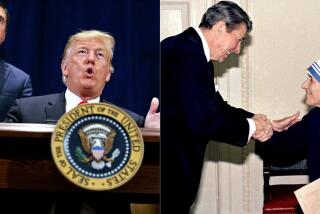U.S. No Threat, Reagan Tells Soviet People : He Calls for Annual Summit Conferences
- Share via
WASHINGTON — President Reagan told the Soviet people Saturday that Americans “do not threaten your nation and never will” and called for increased contacts between the superpowers, including annual summit meetings.
In an address broadcast abroad by the Voice of America and heard without jamming in parts of the Soviet Union, Reagan struck an exceptionally conciliatory tone just a week before he departs for his meeting in Geneva with Soviet leader Mikhail S. Gorbachev.
He urged “expanded contact between our two great societies, wherever there is mutual interest,” and said he hopes that the Nov. 19-20 Geneva talks will be “fruitful” and lead to more meetings.
Proposal on Meetings
In an earlier interview with U.S. News & World Report magazine, released Saturday, the President said he would like to follow the Geneva summit with meetings in the United States and Soviet Union.
Exchange of Meetings
“I will probably propose, if they don’t, that we have an exchange of future meetings in our own countries instead of going to a neutral country,” he told the magazine. He said it would “automatically follow” that the sessions should occur “next year and the year after.”
He also answered “yes” when asked if the summit might be expected to produce a formal commitment on arms control that would then be fleshed out by U.S. and Soviet negotiators at Geneva.
Reagan’s pre-summit radio address was also heard in the United States. He told his audience that “we should open a dialogue between our nations, so leaders of each country would have the same chance to communicate to the people of the other on television.”
The Soviets frequently try to jam Voice of America programs, but White House spokesman Larry Speakes said that while they jammed 15 frequencies to some degree Saturday, they did not jam two or three in Moscow and one in Leningrad, permitting these to carry the President’s remarks.
Speakes said the White House hopes that “this development will set a precedent which will allow the Soviets to put a permanent end to jamming on all frequencies.”
Reagan did not mention any hopes for making progress at the summit on arms control issues, saying “these are complicated negotiations and satisfactory results will take long, hard work.” But he said that U.S. and Soviet negotiators at Geneva, who Thursday recessed their sessions until Jan. 16, “are working hard to reach a breakthrough.”
When those talks resume, he said, the negotiators should begin discussing his proposal to share research developed under his Strategic Defense Initiative to nations that make reductions in offensive nuclear weapons.
“If and when our research proves that a defensive shield against nuclear missiles is practical, I believe our two nations, and those others that have nuclear weapons, should come together and agree on how gradually to eliminate offensive nuclear weapons as we make our defensive system available to all,” he said. “We ought to start talking about this process at the Geneva arms talks.”
The Soviets contend that the space-based defensive weapons system, popularly known as “Star Wars,” will violate the 1972 Anti-Ballistic Missile Treaty and that no arms control agreement can be reached with the United States as long as Washington pursues the program.
But Reagan, who has insisted that the space weapons project will not be a bargaining chip in arms negotiations, told the Soviet people: “Your own government has been conducting longstanding and extensive programs on its own defensive systems, including advance research. The United States is just beginning a long process of investigating defenses.”
Expanded Radio Address
Reagan expanded his usual five-minute Saturday radio address to the nation to 10 minutes for the pre-summit talk. He spoke from the Voice of America studios here, aiming his remarks at a potential Soviet audience estimated at 23.6 million. His speech also was carried on domestic radio networks and televised in this country by Cable News Network and in 50 other countries by the Voice of America’s Worldnet Television Network.
Reagan said in his radio talk that he appreciated the “rare opportunity” that he had recently of being interviewed by Soviet journalists but complained that only parts of the interview were published in the government newspaper Izvestia and that “much of what was left out I think is important.”
Reagan raised at least three of the issues that Izvestia had deleted: human rights, Afghanistan and other regional conflicts involving the Soviets, and a proposal by the United States after World War II to give up its nuclear weapons to an international authority. But in doing so he refrained from directly criticizing the Soviets the way he has in the past.
On human rights, for example, he asked “the world’s leaders to abide by what they committed themselves to do” when they signed the Helsinki Accords a decade ago, pledging to respect human rights, permit freedom of speech and travel and improve communication among nations. Both the United States and Soviet Union signed the accords.
Reagan rejected as “distortions” Soviet press reports about “America’s hostile intentions” and declared:
“Americans are peace-loving people; we do not threaten you and never will. The American people are tolerant, slow to anger, but staunch in defense of their liberties and, like you, their country.”
He concluded his address by saying: “Everything has a season. Let us hope as we near Christmas and the New Year that this will be the season for peace. Thank you for welcoming me into your homes. God bless you.”
More to Read
Sign up for Essential California
The most important California stories and recommendations in your inbox every morning.
You may occasionally receive promotional content from the Los Angeles Times.













